It seems that grounding doesn't have perceptible effect on the audio quality of my cheap chinese generic TPA3251 amplifier.
However, in the absence of grounding, the metal case of the amplifier conducts a little bit of electricity that I can feel with my fingers.
Perhaps, is it better to ground it just for longevity of the amp and safety?
However, in the absence of grounding, the metal case of the amplifier conducts a little bit of electricity that I can feel with my fingers.
Perhaps, is it better to ground it just for longevity of the amp and safety?
Last edited:
It's one of those with a switchmode 'wall wart' adapter right?
Actually being able to feel a tingle is fairly common with those and not necessarily dangerous - I have some genuine iPad chargers, among other things, that do it.
It's caused by a supression capacitor connected between the primary and secondary side of the switching transformer - this is designed to reduce radio interference but has the unfortunate side effect that metal-cased devices connected to the power supply are effectively live at mains voltage (though with very little current behind it).
If you were to stick a multimeter between the case and ground you might measure anything up to 100+ volts AC, but if you put the same meter on the current range it should show less than a milliamp if that. So as you can see, it's annoying, but certainly not dangerous, and actually quite common.
I'm not saying that your particular power supply is or isn't safe, but this is definitely a quirk of some switching power supplies and isn't necessarily anything to be worried about. If in doubt you should get it checked though.
Actually being able to feel a tingle is fairly common with those and not necessarily dangerous - I have some genuine iPad chargers, among other things, that do it.
It's caused by a supression capacitor connected between the primary and secondary side of the switching transformer - this is designed to reduce radio interference but has the unfortunate side effect that metal-cased devices connected to the power supply are effectively live at mains voltage (though with very little current behind it).
If you were to stick a multimeter between the case and ground you might measure anything up to 100+ volts AC, but if you put the same meter on the current range it should show less than a milliamp if that. So as you can see, it's annoying, but certainly not dangerous, and actually quite common.
I'm not saying that your particular power supply is or isn't safe, but this is definitely a quirk of some switching power supplies and isn't necessarily anything to be worried about. If in doubt you should get it checked though.
The AIYIMA TPA3251 amplifier(~39 US dollars) is powered by an ungrounded 32V 5A adaptor(~18 US dollars).
It is going to be connected to Raspberry Pi which is also not grounded.
The amplifier is designed to be grounded through the RCA cables. If it's grounded through the power supply, it sends crazy amounts of distortions to speakers.
If I stick multimeter probes between ground and the metal case of the amplifier, the measured AC voltage is about 1.3~1.4 volts.
Is grounding going to increase longevity or sound quality of the amp? Or, is it going to reduce any fire risk?
It is going to be connected to Raspberry Pi which is also not grounded.
The amplifier is designed to be grounded through the RCA cables. If it's grounded through the power supply, it sends crazy amounts of distortions to speakers.
If I stick multimeter probes between ground and the metal case of the amplifier, the measured AC voltage is about 1.3~1.4 volts.
Is grounding going to increase longevity or sound quality of the amp? Or, is it going to reduce any fire risk?
Attachments
-
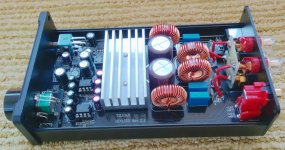 06|product interior|2019-10-17|01.jpg904.2 KB · Views: 259
06|product interior|2019-10-17|01.jpg904.2 KB · Views: 259 -
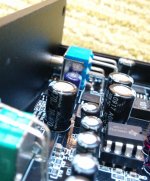 06|product interior|2019-10-17|03.jpg521.8 KB · Views: 251
06|product interior|2019-10-17|03.jpg521.8 KB · Views: 251 -
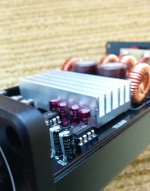 06|product interior|2019-10-17|04.jpg582.4 KB · Views: 235
06|product interior|2019-10-17|04.jpg582.4 KB · Views: 235 -
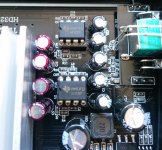 06|product interior|2019-10-17|05.jpg391.4 KB · Views: 252
06|product interior|2019-10-17|05.jpg391.4 KB · Views: 252 -
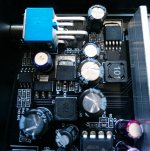 06|product interior|2019-10-17|06.jpg392.8 KB · Views: 227
06|product interior|2019-10-17|06.jpg392.8 KB · Views: 227 -
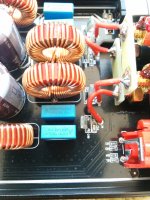 06|product interior|2019-10-17|07.jpg597.3 KB · Views: 83
06|product interior|2019-10-17|07.jpg597.3 KB · Views: 83 -
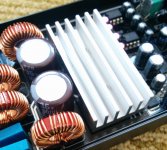 06|product interior|2019-10-17|10.jpg301.6 KB · Views: 77
06|product interior|2019-10-17|10.jpg301.6 KB · Views: 77 -
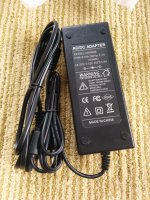 04|product|2019-10-31|01.jpg730.1 KB · Views: 79
04|product|2019-10-31|01.jpg730.1 KB · Views: 79 -
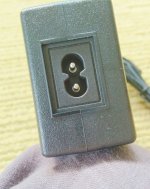 04|product|2019-10-31|02.jpg821.1 KB · Views: 81
04|product|2019-10-31|02.jpg821.1 KB · Views: 81 -
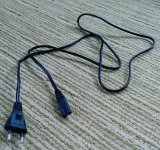 04|product|2019-10-31|04.jpg467.3 KB · Views: 74
04|product|2019-10-31|04.jpg467.3 KB · Views: 74
Last edited:
It seems crazy amounts of distortions were caused by ground loop. The amp was connected to two grounds when it produced a lot of distortions.
If the power supply is grounded, but the source device is not, I do not hear distortions. It seems that as long as there is no ground loop, grounding doesn't seem to affect audio perceptibly.
If the power supply is grounded, but the source device is not, I do not hear distortions. It seems that as long as there is no ground loop, grounding doesn't seem to affect audio perceptibly.
Last edited:
The capacitor in such switchmode supplies is to prevent electrocution as well as radio interference.
The capacitive leakage between primary and secondary in the switching transformer is significant due to the high frequencies - currents of 10mA or more are possible as the primary may be something like 240V at several 100kHz across several 10's of pF of inter-winding leakage.
By adding a capacitor you short this out at high frequecies, while providing no DC path(*).
However there's still leakage at mains frequency through the capacitor, but at a fraction of a mA typically, enough to tingle with damp fingers, not enough to electrocute.
In a "proper" supply with mains earth the transformer will have an earthed inter-winding screen, and the secondary circuit will normally be directly earthed anyway.
Transformers are not so isolating at high frequencies...
(*) the cap has to connect between the non-switched mains and the secondary, note. For a 2-pin supply this could be live or neutral or a tap point between them even. If polarized then you'd connect to the neutral.
The capacitive leakage between primary and secondary in the switching transformer is significant due to the high frequencies - currents of 10mA or more are possible as the primary may be something like 240V at several 100kHz across several 10's of pF of inter-winding leakage.
By adding a capacitor you short this out at high frequecies, while providing no DC path(*).
However there's still leakage at mains frequency through the capacitor, but at a fraction of a mA typically, enough to tingle with damp fingers, not enough to electrocute.
In a "proper" supply with mains earth the transformer will have an earthed inter-winding screen, and the secondary circuit will normally be directly earthed anyway.
Transformers are not so isolating at high frequencies...
(*) the cap has to connect between the non-switched mains and the secondary, note. For a 2-pin supply this could be live or neutral or a tap point between them even. If polarized then you'd connect to the neutral.
Last edited:
If the complete amp (Amp itself and power supply) lets you small amounts of electricity, try to not grounding the amp directly, but by means of a resistor in the order of 100KΩ shunted by a capacitor of, say, 0.1µF @ 600V. This way the loop is not closed directly, but the 100KΩ resistor deviates this leakage to ground. Definitive values of both components must be tried directly by you.
Last edited:
The AIYIMA TPA3251 amplifier(~39 US dollars) is powered by an ungrounded 32V 5A adaptor(~18 US dollars).
It is going to be connected to Raspberry Pi which is also not grounded.
The amplifier is designed to be grounded through the RCA cables. If it's grounded through the power supply, it sends crazy amounts of distortions to speakers.
The odds are pretty high that your grounding problem is not in your amplifier... but rather in your signal source, through the RCA cables.
These devices float (no ground) as a means to avoid catastrophic ground loops of the kind that destroy equipment.
Douglas Blake, I experienced ground loop from amplifier when both the sound source and the power source were grounded. If only one of them was grounded, it was fine. Thus, the amplifier can be grounded through either the sound source or the power source.
Is it ok to float an amplifier in terms of amplifier longevity and audio quality?
Is it ok to float an amplifier in terms of amplifier longevity and audio quality?
Last edited:
If you keep low voltage GND and PE separated you Will have optimal results. Connect the metal case of the amplifier always to PE. You can connect GND of that amplifier to PE but never directly to avoid ground loops. If you really want GND to be referenced with PE then you can connect GND to PE with a small value resistor. I leave GND floating.
Last edited:
I leave GND floating.
If you leave the ground of your amplifier floating, is the amplifier not grounded? I do not understand your setup.
Protective Earth. It is good and mandatory for safety but less good for audio.
What is protective earth? No material seems to explain protective earth directly. Do you mean a metal rod inserted into the earth? How best can I connect the metal amp case to PE or whatever?
Last edited:
What is protective earth? No material seems to explain protective earth directly. Do you mean a metal rod inserted into the earth? How best can I connect the metal amp case to PE or whatever?
Section 7 of this page
Earthing (Grounding) Your Hi-Fi - Tricks and Techniques
It is better to call this kind of connection earthing, not grounding, because we can distinguish grounding to ground plane (metal case of the equipment) and protective earth connection which is common for equipment not double insulated.
jean-paul clearly understand what he speaks.
It is not good to mess with live side (230V ac, 115V ac) if you don't know what are you doing.
Earthing have function to protect from unwanted connection of live parts to the metal case, but also to conduct static charge which builds itself on floated equipment (double insulated), or EMI (RFI) protection which is today all around us (EMC directive).
In audio system earthing should be done only on only one audio equipment (best point is audio amplifier, it has GND connection point), because in that way we exclude ground loop.
If audio equipments are interconnected by analog audio or digital coaxial cable we connect all grounds (of all equipment in the chain) to the protective earth and avoid static charge build which is unpleasent.
jean-paul clearly understand what he speaks.
It is not good to mess with live side (230V ac, 115V ac) if you don't know what are you doing.
Earthing have function to protect from unwanted connection of live parts to the metal case, but also to conduct static charge which builds itself on floated equipment (double insulated), or EMI (RFI) protection which is today all around us (EMC directive).
In audio system earthing should be done only on only one audio equipment (best point is audio amplifier, it has GND connection point), because in that way we exclude ground loop.
If audio equipments are interconnected by analog audio or digital coaxial cable we connect all grounds (of all equipment in the chain) to the protective earth and avoid static charge build which is unpleasent.
Protective earth is not a facility that is implemented to improve audio performance, it is a safety feature. For all the electrical appliances you have at home, there is a risk that a 230V/115Vac wire gets loose (or another conductive bridge is formed) and makes electrical contact to a metallic chassis you may touch. If the chassis is not connected to protective earth, you will have a dangerous electrical shock when you touch the chassis. If the chassis is connected to protective earth, the chassis will be at earth potential like you and you will not get an electrical shock but your house safety relay should disconnect your house supply. This is equally valid for commercial audio equipment where safety considerations also apply. This all makes sense with protective earth.
Any DIY circuit you make yourself is feed from a rather low voltage power supply inside which there in a safety isolation barrier (normally the insulation in the power transformer) such that net potentials cannot reach the secondary side and harm you.Therefore, you need not connect your DIY circuit to protective earth. Be aware that you can always get a serious electrical shock if your DIY circuit uses or generates higher voltages (>50V). But, if your DIY construction includes a power supply inside, the chassis (metallic) should also be connected to protective earth.
Last, if you have hum problems in your audio chain, protective earth can sometimes help solving such problems. But, the quality of protective earth lines are many and some are so poor that they introduce more noise than they remove. Therefore, also I let my audio ground "float" without connection to safety earth unless I have a serious hum problem.
Any DIY circuit you make yourself is feed from a rather low voltage power supply inside which there in a safety isolation barrier (normally the insulation in the power transformer) such that net potentials cannot reach the secondary side and harm you.Therefore, you need not connect your DIY circuit to protective earth. Be aware that you can always get a serious electrical shock if your DIY circuit uses or generates higher voltages (>50V). But, if your DIY construction includes a power supply inside, the chassis (metallic) should also be connected to protective earth.
Last, if you have hum problems in your audio chain, protective earth can sometimes help solving such problems. But, the quality of protective earth lines are many and some are so poor that they introduce more noise than they remove. Therefore, also I let my audio ground "float" without connection to safety earth unless I have a serious hum problem.
Last edited:
According to Earthing system - Wikipedia, protective earth protects my body from currents flowing on metal surface, and functional earth is for something else.
Now, I have a crude understanding of protective earth.
I am thinking about connecting the amp to Raspberry Pi. Both the amp and Raspberry Pi are powered by ungrounded power supplies. When the amp is connected to my desktop computer which is powered by a grounded power supply, there is no issue with grounding, and I feel no electricity on the metal surface of the amp.
* How best do I ground or earth the amp when it's connected to Raspberry Pi?
* Can an ungrounded amp produce good sounds?
* How do earthing and grounding affect sound quality?
I want both safety and audio quality.
Now, I have a crude understanding of protective earth.
I am thinking about connecting the amp to Raspberry Pi. Both the amp and Raspberry Pi are powered by ungrounded power supplies. When the amp is connected to my desktop computer which is powered by a grounded power supply, there is no issue with grounding, and I feel no electricity on the metal surface of the amp.
* How best do I ground or earth the amp when it's connected to Raspberry Pi?
* Can an ungrounded amp produce good sounds?
* How do earthing and grounding affect sound quality?
I want both safety and audio quality.
Last edited:
Elektor magazine used to have an illustrated safety page in every issue. It would make things way more clear for people who are inexperienced in this area. I see one can look into it online only when one registers. Maybe a member has an older issue and can make a scan of it?
Bravo monsieur!
Protective earth is not a facility that is implemented to improve audio performance, it is a safety feature. For all the electrical appliances you have at home, there is a risk that a 230V/115Vac wire gets loose (or another conductive bridge is formed) and makes electrical contact to a metallic chassis you may touch. If the chassis is not connected to protective earth, you will have a dangerous electrical shock when you touch the chassis. If the chassis is connected to protective earth, the chassis will be at earth potential like you and you will not get an electrical shock but your house safety relay should disconnect your house supply. This is equally valid for commercial audio equipment where safety considerations also apply. This all makes sense with protective earth.
Any DIY circuit you make yourself is feed from a rather low voltage power supply inside which there in a safety isolation barrier (normally the insulation in the power transformer) such that net potentials cannot reach the secondary side and harm you.Therefore, you need not connect your DIY circuit to protective earth. Be aware that you can always get a serious electrical shock if your DIY circuit uses or generates higher voltages (>50V). But, if your DIY construction includes a power supply inside, the chassis (metallic) should also be connected to protective earth.
Last, if you have hum problems in your audio chain, protective earth can sometimes help solving such problems. But, the quality of protective earth lines are many and some are so poor that they introduce more noise than they remove. Therefore, also I let my audio ground "float" without connection to safety earth unless I have a serious hum problem.
Bravo monsieur!
Last edited:
Therefore, also I let my audio ground "float" without connection to safety earth unless I have a serious hum problem.
Do you just let your amp completely float without any grounding or earthing?
That's good to know.
I hope there is no stray live wire nearby.
- Status
- This old topic is closed. If you want to reopen this topic, contact a moderator using the "Report Post" button.
- Home
- Amplifiers
- Class D
- Does a mini class-D amp benefit from electrical grounding?